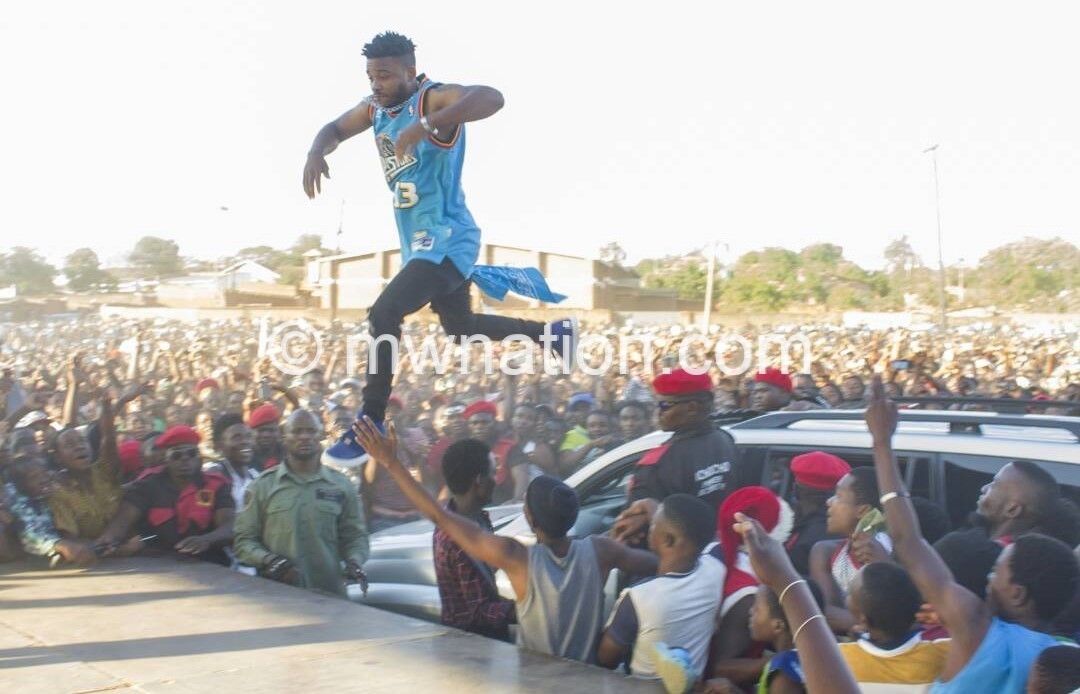Fredokiss and his ghetto gospel
On a sunny afternoon at Ndirande Community Ground, Fredokiss’s fast and furious renditions did not only melt the hearts of the ghetto youths, they also ignited the fire of activism in them.
In the scorching heat, he sang, for free, a ghetto gospel to the ‘down-trodden and broken-hearted’ which was received with palpable enthusiasm. In that frenzy of a moment, the youths, hypnotised by the cacophony of crashing cymbals, surrendered their bodies and souls to the mesmerising sounds.

James Chauluka, one fan in the thousands lost in song and dance, encapsulated the moment. “Here is an artist who has climbed down the scaffold to interact with us in our own world where others spurn to look at,” said the youth from Ndirande’s Safarao location.
Like Tupac Shakur, an American hip hop rapper whose songs To Live and Die in LA, Life Goes On, and Changes address real issues facing people from the ghetto, Fredokiss is an embodiment of ghetto hip hop culture—defined by lyrics that draw attention to the realities of violence, drug abuse, poverty and desperation.
Some of his songs bear the hue of ghetto ethos, life-centred subject matter and hard beat instrumentation. He epitomises the spirit of popular culture in entertaining ‘the ordinary person’ and at the same time speaking their mind.
Fredokiss, whose real name is Penjani Kalua, in an interview with Weekend Nation, says he brings his music to the ghetto youth because his music resonates more with them in general, and particularly those who are marginalised.
He responds to another moniker, Ghetto King Kong. That is the very basis of his musical and artistic expression and prowess. “That name connotes someone so powerful but has the welfare of the people at heart, just like gorilla in the King Kong movie. I am trying to give the ghetto some positivity. It’s just an artistic coinage that I made to associate myself with the ghetto,” says Fredokiss.
He addresses day-to-day social issues in his songs. For him, that is a sure way to make the youth look around and examine themselves.
“I haven’t done it perfectly but I believe I have managed to make some youths become active in solving challenges affecting them,” he says.
For Goliyo resident Chimwemwe Rapozo, a stratified ghetto needs a Fredo of some kind. “The youth choose who to align with. We, the ‘nonentities’ from the lower stratum of society, relish songs of the likes of Fredokiss. What he sings resonates well with our way of life,” says Rapozo.
Fredo uses his song Malamulo Khumi a mu Ghetto, Fredokiss as an introduction to ghetto life. Posing as someone in the ghetto, he presents the 10 commandments:
Malamulowa ndi a mu ghetto… awa ndi malamulo khumi mu ghetto…..one, kusunga chinsinsi nkofunika, kambakamba akhalira deal zikanika, zikanika zinthu zoti zikanachitika…
In the ghetto, where life is harsh, survival depends on one’s discipline in keeping friends’ secrets. Saving money is also paramount. Womanising, which brings down empires, is discouraged.
Of Fredokiss songs, Chauluka says he enjoys Zautsiru featuring Young Kay (rebranded as Hyphen) and Martse. The song talks about the injustices that people from the ghetto suffer in the hands of government. The song opens with the persona declaring that he hates mediocrity. He then tackles poverty, disease and power outages, challenges that have hit people living in the ghettos hard.
Then, the persona takes a swipe at amwenye alleging that some mistreat Malawians when doing their business but in the end the same Malawians end up helping them get rich.
In Dear Jah Jah featuring Angie and 4Sight, Fredokiss turns to God for answers to the problems people face.
After realising that earthly leaders have failed the ghetto people, Fredokiss reaches out to Jah and asks Him how ghetto youths like him can be blessed.
He sings: Dear Jah Jah/Ndakumverani mbiri, mwadalitsa ambiri/Dear Jah Jah why can’t you hear me/Dear Jah Jah ndipange bwanji kuti mundione, mwina mwina nane zanga ndi kusintha.
Through these lyrics, Fredokiss can be placed in the literature of realism genre where he portrays life in its raw state rather than portraying it romantically. The raw language in the songs such as Zautsiru are clichés that are synonymous with people from the ghetto. It is in the ghetto where life is real unlike in other locations where it is romanticised.
By connecting with them musically, Fredokiss lays a bridge of communication through which he can champion various changes to the youth.
Although he cannot change them immediately, he is fast becoming an agent of change in a section of society that feels detached from the upper class.
Fredokiss says the shows are not ‘really free’ as the youth are paying with a unique currency—love. “Not all the time should music be exchanged with money, especially when that music is aimed at changing mindsets,” he affirms.
And changing the mindset was the gospel he brought to the youth of Ndirande Township. On that day he sang the change the youth must embrace—their way of thinking, viewing themselves, perceiving their communities and being alert on the consequences of population increase. n





